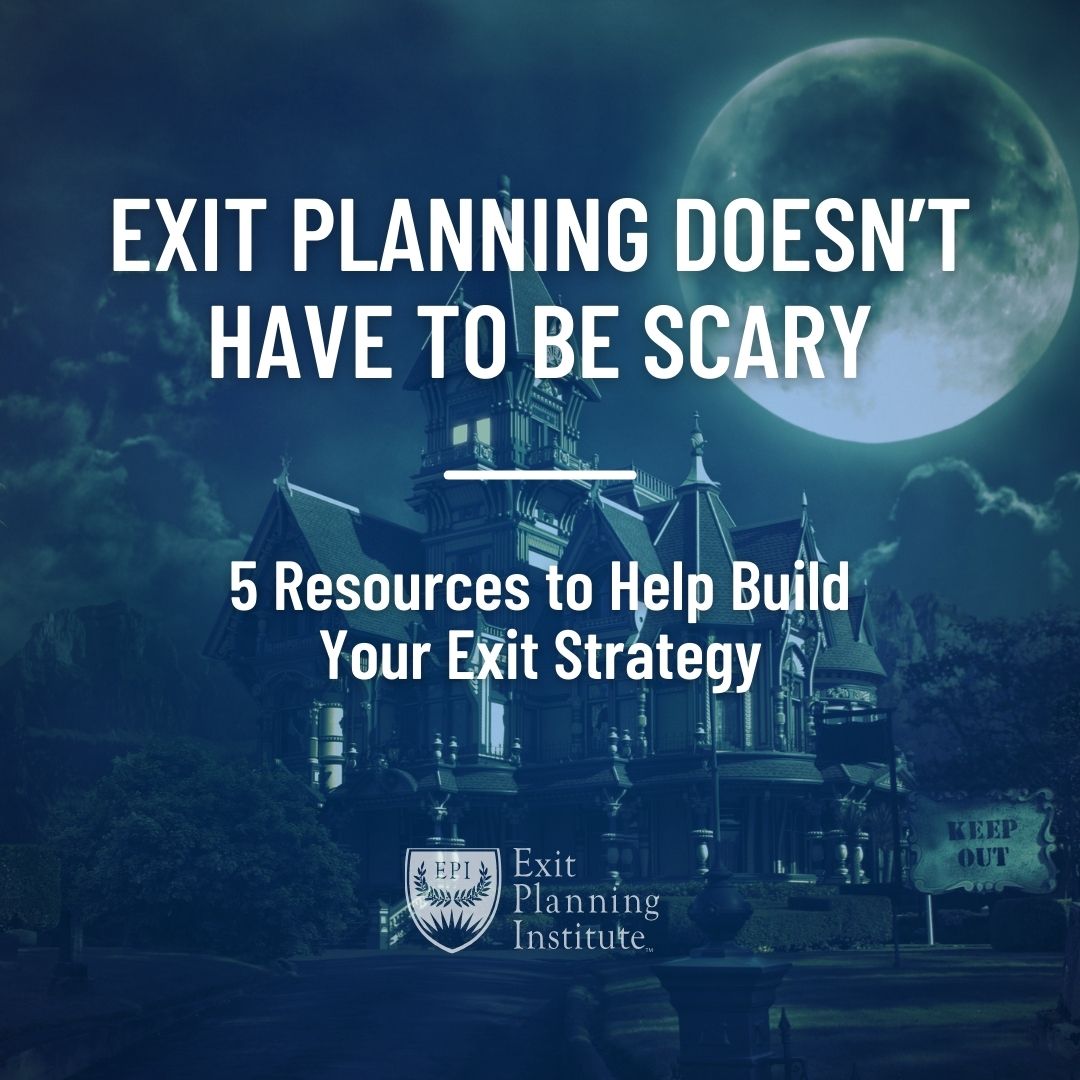
THE EXIT PLANNING BLOG
Keep up-to-date with exit planning, succession planning, industry trends, unique specialty insights, and useful content for professional advisors and business owners.
Share this
Exit Planning Haunted House
by Colleen Kowalski on October 9, 2020

Many business owners are afraid of the word “exit”. Any discussion of leaving their lifelong business sends a chill up their spine. Thinking about exiting your business is like going through a Haunted House. You find yourself afraid of monsters lurking beyond every corner and try to take a path that limits the amount of times you will scream, jump, or give up on the journey all together.
Entering the Haunted House
There are two ways that one can find themselves in a haunted house:
- You go in willingly and are excited about the adrenaline rush that comes with the unknown. You don’t know what’s coming but you are ready to face it when it jumps out.
- Someone told you that you must go into the house even though it is the last possible place you would like to spend your time. You would rather be doing anything else, and suggested this to that person, and they steadfastly refused. This whole journey is out of your control and you are starting to question why you are friends with this person in the first place.
Now, clearly one of these options is better than the other. I can guarantee that no one would like to be dragged into a haunted house without agreeing to go inside. The same goes for exiting your business. Business owners are afraid of exiting their business if they have no plan on doing so. They are afraid of the future and of getting old. Exiting their business makes them feel ancient and they are not ready for that. However, the most successful business owner is one who is prepared for their eventual exit. They are ready to take the first step into the haunted house and accept the fact that they will feel scared at some point.
Walking through the Haunted House
Once you walk into a Haunted House there are a few paths you can take.
- You could take a short cut, hoping that it will be the easiest way out of the house. Little do you know, this “short cut” has more scares than any other path in the house and causes you more stress and worry in the long run.
- You could stick to the path and face the monsters as they appear. You are prepared to be scared and find yourself more accustomed to the house as you forge ahead.
- There is also the option of walking through the house with your eyes closed, hoping to make it out unscathed. You end up stuck in a corner surrounded by a ghost, a vampire, and a man with a chainsaw. (I do not recommend this option)
For those heading to a haunted house this fall, 2 is your best option. For those planning on exiting your business in the future, the same goes for you. While it may seem tempting to take the shortest path or close your eyes and refuse to acknowledge any of the many terrifying things around you, options 1 and 3 will only end poorly.
Venturing off the beaten path in a haunted house is risky. Taking a shortcut in exiting your business can leave you with less value in your business and less profit in your pocket. Exit Planning can seem confusing and complicated but avoiding key steps in the exit planning process greatly effects the success of your overall exit strategy. According to Walking to Destiny by Chris Snider, “ Many business owners are trapped in their businesses, unable to unlock their wealth, because they are so reliant on the income the business brings and are financially unprepared for life without that income”. If you skip steps in the exit planning process because you want a quick and easy transition, you will not be prepared for life after your exit. Try to stay on the path, you will still face some frightening things, but at least you’ll be ready for them.
Going through a business exit without a Certified Exit Planning Advisor (CEPA) is like walking through a haunted house alone with your eyes closed. You do not know where you are going and before you know it, you are trapped in a corner with your biggest fears in front of you. A CEPA prepares you for every aspect of your exit by using the Value Acceleration Methodology. This limits the frightening parts of exiting your business like, “How do I exit my business successfully?” “How will I manage my finances?”, and “How valuable is my business to buyers?”. Next time you go through a haunted house, try to keep your eyes open.
Leaving the Haunted House
You did it. You made it through the entire haunted house with only minimal crying and screaming. You give yourself a pat on the back, or maybe reward yourself with a cocktail. Looking back at your time in the haunted house, you feel proud of managing the scary monsters, the ghoulish music, and the flashing lights. But then something strange happens: you don’t know what to do next. If you do not plan on what you will do after you exit your business, you will spend the entire third act of your life unfulfilled. Some business owners refuse to go through a business exit because they are afraid of what they will do when the exit is finalized. Chris Snider said in Walking to Destiny, “I had this fear that I would have an abundant amount of free time if I distanced myself from being in the business 60 hours a week, but I was wrong”. After all the excitement of the haunted house, everything else can seem mundane. That is why we recommend planning for what you want to do in the future, before you even enter the haunted house.
Working with a CEPA helps to provide a holistic approach to the exit planning process. Instead of focusing solely on how to sell or transition your business, a CEPA will assist in creating a Master Plan that incorporates a complete Third Act plan. According to Walking to Destiny, “You owe it to yourself to plan a third act that sets you up to stay connected with your identity and excel in your new ventures, embracing who you’ve been and who you want to be”.
Exiting your business can be scary, but having a solid exit plan and a CEPA by your side makes it much more manageable.
Download Chapter 3 of Walking to Destiny for more information on preparing for a business exit.
Share this
- Blog (520)
- CEPA (367)
- exit planning (243)
- CEPA community (181)
- Business Owner (135)
- Exit Planning Summit (85)
- EPI Chapter Network (82)
- Exit Planning Partner Network (76)
- EPI Announcement (49)
- Content (48)
- Value Acceleration Methodology (46)
- Webinars (37)
- Excellence in Exit Planning Awards (32)
- Marketing (30)
- 2024 Exit Planning Summit (28)
- 5 Stages of Value Maturity (26)
- Books (24)
- Exit Planning Teams (22)
- EPI Team (21)
- 2023 Exit Planning Summit (20)
- Leadership (20)
- family business (19)
- women in business (19)
- Intangible Capital (18)
- Exit Options (17)
- Black Friday (16)
- EPI Academy (16)
- CPA (15)
- State of Owner Readiness (14)
- Chapters (12)
- Chris Snider (12)
- National Accounts (12)
- Small business (12)
- Walking to Destiny (12)
- charitable intent (12)
- personal planning (12)
- Financial Advisors (9)
- 5 Ds (8)
- About us (8)
- Podcast (8)
- Insiders Bash (7)
- Scott Snider (7)
- Christmas (6)
- Exit Planning Content Library (6)
- Case Studies (5)
- Owner Roundtables (5)
- Season of Deals (5)
- Value Advisors (5)
- financial planning (5)
- Awards (4)
- Exit & Succession (4)
- Five Ds (4)
- executive training (4)
- Circle of Excellence (3)
- Owners Forum (3)
- forbes (3)
- EPI Thought Leadership Council (2)
- Exit Is Now Podcast (2)
- Peter Christman (2)
- Three Legs of the Stool (2)
- Veteran (2)
- Whitepapers (2)
- author (2)
- Business Owners Forum (1)
- DriveValue (1)
- business consultants (1)
Subscribe by email
RELATED ARTICLES






